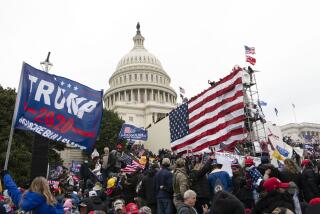Congress May Grant Immunity to Gain Key Testimony
- Share via
WASHINGTON — Congressional investigators, hampered in their efforts by key witnesses who refuse to testify, are hitting a legal roadblock reminiscent of the Watergate era as they pursue their inquiry into the Iran- contras controversy.
Lawyers for central figures fear that anything said in testimony to Senate or House panels could be used against their clients if criminal prosecutions are undertaken. Thus, vital witnesses are invoking the Fifth Amendment’s guarantee against self-incrimination, at least until their lawyers can discuss matters with the yet-to-be named independent counsel.
And the obstacles are likely to increase: Lawyers involved in the Iran case say more witnesses will refuse to answer questions for the same reason.
Eventually, Congress may try to remove the roadblock with the same tool it used to obtain the crucial Watergate testimony of former White House counsel John W. Dean III and Jeb Stuart Magruder, a former campaign official for Richard M. Nixon--providing witnesses with limited immunity from prosecution.
In the near term, however, two important figures already have refused to testify in the early stages of the current congressional investigation. Marine Lt. Col. Oliver L. North, who was fired from the National Security Council, and Vice Adm. John M. Poindexter, who resigned as President Reagan’s national security adviser, invoked their Fifth Amendment protection when they appeared before the Senate Intelligence Committee Tuesday and Wednesday.
May Seek Immunity
A source familiar with the legal strategy of North and retired Air Force Gen. Richard V. Secord, who has been prominent in the approach to Iran and support for the contras, says both men will rely on their Fifth Amendment right until they have the opportunity to seek a grant of immunity from the independent counsel.
Selection of that counsel is not likely for several days. Atty. Gen. Edwin Meese III said Tuesday that application for an independent counsel would go quickly to the special federal court here that decides such appointments. But, as of late Wednesday, Justice Department attorneys had not yet completed the application.
So far, the Senate and House Intelligence Committees seem to be leaning against granting witnesses immunity in their probe.
Potential defendants testifying at congressional hearings under grants of immunity present prosecutors with sizable problems, as the Watergate special prosecution force noted in its final report.
Any prosecution that could be shown to be based on any direct or indirect use of a witnesses’ testimony at congressional hearings would be barred, the Watergate prosecutors said. Moreover, they noted, televised hearings might create adverse publicity about potential defendants.
As a result, in the Watergate case, Special Prosecutor Archibald Cox tried unsuccessfully to persuade the Senate select committee to postpone its hearings. He also failed in his effort to obtain a court order requiring the committee to hold closed hearings or, at least, to bar radio and television coverage.
Tactic Works
But Cox then came up with a different tactic that did work. In the case of Dean, for example, whose Senate testimony proved crucial in unraveling the Watergate cover-up, Cox first had the prosecution’s evidence against Dean delivered under seal to the U.S. District Court.
This made it easier for prosecutors to overcome any defense challenge that the case depended on Dean’s own words, for which he had been granted immunity.
In the end, Dean pleaded guilty to one count of conspiring to obstruct justice, drew a one- to four-year prison term and was released after serving four months.
More to Read
Get the L.A. Times Politics newsletter
Deeply reported insights into legislation, politics and policy from Sacramento, Washington and beyond. In your inbox twice per week.
You may occasionally receive promotional content from the Los Angeles Times.










